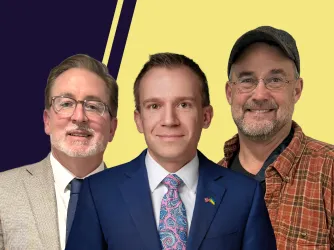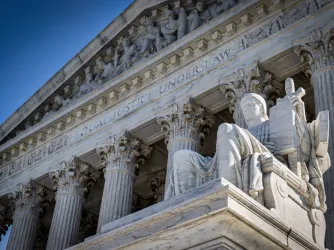Table of Contents
‘Your words are violence!’ Cornell students shout down Ann Coulter in latest heckler’s veto to roil campuses this semester

Shutterstock.com
Ann Coulter (file) via Shutterstock
On Wednesday night, Cornell University students eager to hear Ann Coulter speak at an event organized by Cornell’s student chapter of the Network of enlightened Women left disappointed.
Ahead of the event, flyers circulated on campus calling on the university to “deplatform” Coulter by canceling the event. The university did not capitulate, however, and stood by its promise to protect student groups’ right to host expressive events, commendably refusing to cancel the event in advance.
But that would not prove enough to ensure free speech prevailed.
Student attendees opposed to the event produced such a substantial disruption that the event was cut short after just 30 minutes. That’s why FIRE wrote Cornell yesterday, telling the university it must educate students about the contours of free expression, including the difference between protected speech and unprotected speech, like the heckler’s veto.
As the event started, protesters gathered outside the law school. The dean of students opened the event by warning the audience that any disruptions would be cause for removal. As Coulter entered the room, an audience member — who was quickly escorted from the room — began loudly playing circus music on a speaker. Shortly after Coulter began speaking, more individuals in the audience started making noises. They, too, were promptly removed from the event space. One audience member stood up and shouted “your words are violence,” “We don’t want you to speak here,” and “We’re not gonna listen to you, to converse with you! We don’t want your ideas here! Leave! Leave! We don’t want you here!”
After that individual’s removal, more audience members began shouting. Then, Coulter herself left the room. When additional security arrived, Coulter briefly returned. Upon being greeted by a still unruly and uncontrolled audience, waved to the crowd and left.
Ultimately, Coulter spoke for just seven minutes.
Cornell initially held strong, declining to participate in “deplatforming,” an increasingly popular form of silencing controversial speakers from sharing their views on campus. But by disrupting the event and making it nearly impossible for the audience to hear the speaker, detractors in the audience had the final say by shutting down Coulter’s speech in real time.
Shouting down speakers and disrupting scheduled events is not free speech or peaceful protest — it’s a “heckler’s veto” that deprives speakers of their right to speak and listeners of their right to listen. Nobody has the right to hijack someone else’s expressive event because they don’t like what the speaker has to say. “You offend me so nobody else should be able to listen to you” is not the way a university can or should operate.
In recent months, students clearly feel emboldened to exercise heckler’s vetoes at institutions across the country. Just last month, Penn State canceled a controversial student-organized comedy show after violence erupted amid protests outside the venue. In September, University of New Mexico students disrupted a student-organized speaking engagement with Tomi Lahren.
By giving detractors the power to personally veto speech they don’t like, colleges teach students that drowning out, shouting down, and disrupting those who express differing opinions is an acceptable response to speech one finds offensive. Colleges that promise free speech also abandon their legal obligations when they allow this to happen: on public campuses, administrators must meet their First Amendment obligations to protect the right to free expression. On private campuses, like Cornell’s, the university independently makes robust commitments to free expression — promises they must keep.
Rewarding the heckler by punishing the speaker only leads to more hecklers — and fewer speakers.
Rewarding the heckler by punishing the speaker only leads to more hecklers — and fewer speakers. To be clear, Cornell did the right thing here, rightly removing disruptive students and warning them beforehand that they would not be permitted to disrupt expressive events. However, as we wrote in a letter to Cornell yesterday, “given the troubling climate for free speech on campuses, universities truly dedicated to free expression must take significant steps to protect students’ expressive rights.”
Cornell’s speech-protective policies are commendable. So we urged the school to take clear steps to back up those policies with education, teaching students the meaning and value of free speech. We told Cornell:
Recent events have made clear that maintaining strong free expression policies and correctly enforcing them is not enough independently to ensure expressive freedoms. Having strong policies protecting free expression does not guarantee a climate of free speech on its own without also educating students about the policies’ importance in safeguarding free expression.
We therefore urge Cornell to take further action by educating its students about what speech is protected under the university’s free speech policies and First Amendment standards, and what speech is not, including the heckler’s veto. Hopefully, this education will prevent students from substantially disrupting events in the future.
Disrupting events — regardless of the views espoused — infringes free speech, which encompasses both the right to speak and to listen. The students disrupting the event on Wednesday interfered with other students’ right to hear the speaker.
Encouragingly, Cornell has appeared to acknowledge this. According to Legal Insurrection, the university apologized to Coulter late yesterday:
Cornell is committed to academic excellence and a core belief that learning flourishes in an environment where diverse ideas are presented and debated without hindrance. We are deeply disappointed that attendees at a campus event rudely and repeatedly disrupted a talk Wednesday evening by conservative commentator Ann Coulter, ’84.
Attendees were apprised at the beginning of the event that anyone preventing another’s ability to speak or be heard would be in violation of university policy and subject to removal and/or referral to the Office of Student Conduct and Community Standards.
The event was interrupted by attendees playing loud music and sound effects, and shouting profanities. Eight college-age individuals were removed from the auditorium following Cornell protocols. All Cornell students among the disrupters will be referred for conduct violations.
After the repeated disruption, Ms. Coulter chose not to continue her public remarks.
“Cornell apologizes to Ms. Coulter and all members of the audience who hoped to hear her remarks. The inappropriate behavior displayed by disrupters does not reflect the university’s values.
Universities across the country facing shout-downs of expressive events must make clear that hecklers impeding others’ right to speak and listen will not be tolerated — and that peaceful protest, or more speech, is the best way to counter opinions with which one disagrees. Free expression promises cannot be truly fulfilled if events like this can be shut down by disruptive students.
FIRE hopes to work with Cornell and institutions across the county to ensure students are clear about what free speech is, and what it isn’t.
FIRE defends the rights of students and faculty members — no matter their views — at public and private universities and colleges in the United States. If you are a student or a faculty member facing investigation or punishment for your speech, submit your case to FIRE today. If you’re faculty member at a public college or university, call the Faculty Legal Defense Fund 24-hour hotline at 254-500-FLDF (3533). If you’re a college journalist facing censorship or a media law question, call the Student Press Freedom Initiative 24-hour hotline at 717-734-SPFI (7734).
Recent Articles
Get the latest free speech news and analysis from FIRE.

Free speech in Trump 2.0
Podcast

The federal charges against Don Lemon raise serious concerns for press freedom

The American people fact-checked their government


